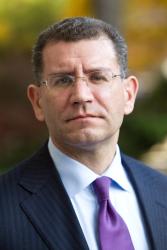

9:30 am EST - 10:30 am EST
Past Event
9:30 am - 10:30 am EST
1775 Massachusetts Ave., NW
Washington, DC
With regime change in Tunisia, and protests continuing in Egypt, the Obama administration faces new and significant foreign policy challenges across the Middle East. While the political future of Egyptian President Hosni Mubarak hangs in the balance, it is clear that the status quo of Egyptian politics cannot be maintained. Egypt may also serve as a bellwether for political change within other Arab nations in the region. Regardless of the eventual outcome of Egypt’s crisis, the administration now faces a changed strategic landscape in the Middle East, and must tackle the crucial task of reorienting U.S. foreign policy in the region.
On February 3, Foreign Policy at Brookings and NBC’s Meet the Press hosted a panel discussion on the crisis In Egypt and the shifting Middle East strategic landscape. David Gregory, host of NBC’s Meet the Press, moderated the session, part of a monthly series of discussions on foreign policy issues. Panelists included Brookings Senior Fellow Kenneth Pollack, director of the Saban Center for Middle East Policy, Anouar Boukhars of McDaniel College and Jennifer Windsor of Georgetown University. Brookings Fellow Shadi Hamid, director of research for the Brookings Doha Center, appeared live from Doha via video feed.
Vice President Martin Indyk, director of Foreign Policy, provided introductory remarks. After the program, the panelists took audience questions.
Watch the full event at msnbc.msn.com »




Aslı Aydıntaşbaş
July 3, 2025

Pavel K. Baev, Robert Einhorn, Sharan Grewal, Samantha Gross, Ryan Hass, Patricia M. Kim, Elizabeth N. Saunders, Yun Sun, Caitlin Talmadge, Shibley Telhami, Andrew Yeo
July 1, 2025

Yun Sun
June 29, 2025